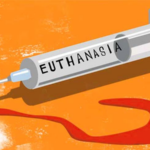MAiD / Euthanasia
The United Nations orders Canada to halt euthanasia regime
In what should be one of the biggest Canadian election stories, on March 21 the United Nations Committee on the Rights of Persons with Disabilities published a report calling on Canada to repeal “Track 2 MAiD” and to put a halt to “advance requests” for assisted suicide, which have been permitted in Quebec since October.
Assisted suicide for terminally ill Canadians with a “reasonably foreseeable death” was legalized in 2016 via Bill C-14. In 2021, the Trudeau government legalized what is referred to as Track 2 MAiD, expanding the eligibility of assisted suicide to those with disabilities or incurable illness who are experiencing suffering, but do not have reasonably foreseeable deaths. According to government data, over 1,300 people were killed under Track 2 MAiD between 2021 and 2023.
As Meagan Gillmore reported in Canadian Affairs, a number of government representatives and civil society organizations convened in Geneva, Switzerland at the United Nations in early March “to discuss Canada’s compliance with the United Nations Conventions on the Rights of Persons with Disabilities,” which Canada has been party to since 2010, although “it has not been formally implemented into Canadian law and is incorporated inconsistently in various laws across the country.”
Canadian government representatives attempted to defend their record by highlighting Ottawa’s Disability Inclusion Action Plan to assist people with disabilities, but the committee was not convinced.
In fact, Rosemary Kayess, the vice-chair of the Committee on the Rights of Persons with Disabilities, asked them how it was possible to not view Track 2 MAiD as a “step back into state-sponsored eugenics,” following that up by asking: “How is Track 2 MAiD not state-sponsored euthanasia?”
As Canadian Affairs noted, Kayess also informed them that the committee had “heard about people with disabilities applying for MAID because they struggle to meet their basic needs.”
The committee’s conclusions were a stunning and comprehensive rebuke of Canada’s assisted suicide laws.
According to Gillmore: “In its recommendations, the UN took aim at Canada’s decision to legalize Track 2 MAiD. Track 2 MAiD was legalized in 2021 after a lower Quebec court ruled that restricting MAiD to people with reasonably foreseeable deaths was unconstitutional.
The committee “noted with concern” that the federal government never appealed that decision. The Quebec decision “fundamentally changed” MAID laws, the committee wrote. It assumes that suffering is inherent to disabilities themselves and not caused by the barriers people with disabilities face.








